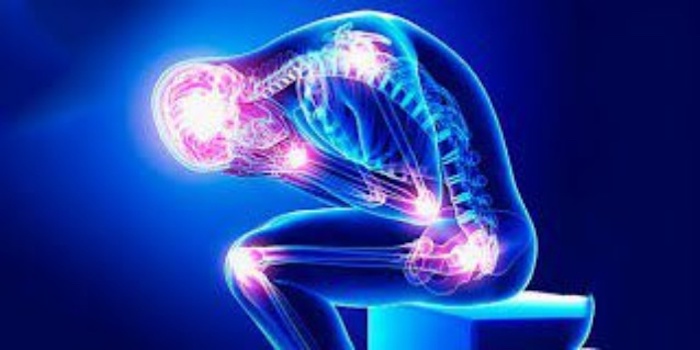
Overview
Most pain subsides after an injury heals or an illness runs its course. But with chronic pain syndrome, pain can last for months and even years after the body heals. It can even occur when there’s no known trigger for the pain. According to the National Center for Complementary and Integrative Health, chronic pain is defined as lasting anywhere from 3 to 6 months, and it affects some 25 million Americans.
Symptoms of Chronic Pain Syndrome
Chronic pain syndrome takes a toll on both your physical and mental health. While the pain can be near-constant, there may be flares of more intense pain due to increases in stress or activity. Symptoms include:
- joint pain
- muscle aches
- burning pain
- fatigue
- sleep problems
- loss of stamina and flexibility, due to decreased activity
- mood problems, including depression, anxiety, and irritability
In one study published in the journal Pain, 60.8 percent of the subjects who reported chronic pain also had depression, most of them with “severe” level symptoms.
Causes of Chronic Pain Syndrome
Conditions that cause widespread and long-lasting pain are, not surprisingly, often linked to chronic pain syndrome. Some of these conditions include:
- Osteoarthritis. This type of arthritis is generally the result of wear and tear on the body and occurs when the protective cartilage between bones wears away.
- Rheumatoid arthritis. This is an autoimmune disease that causes painful inflammation in the joints.
- Back pain. This pain may stem from muscle strains, nerve compression, or arthritis of the spine (called spinal stenosis).
- Fibromyalgia. This is a neurological condition that causes pain and tenderness in various parts of the body (known as trigger points).
- Inflammatory bowel disease. This condition causes chronic inflammation of the digestive tract and can produce intestinal pain and cramping.
- Surgical trauma
- Advanced cancer
Even when these conditions improve (via medications or therapies), some people can still experience chronic pain. This type of pain is generally caused by a miscommunication between the brain and nervous system. (For unexplained reasons, some people can encounter this kind of pain without any known triggers.)
Chronic pain can change the way neurons (nerve cells in the brain that transmit and process sensory input) behave, making them hypersensitive to pain messages. For example, according to the Arthritis Foundation, 20 percent of people with osteoarthritis who get their knees replaced (and presumably have no more painful joint issues) will still report chronic pain.
Risk Factors
Research shows that some people are more susceptible to chronic pain syndrome than others. They are:
- Those with chronic and painful conditions, such as arthritis.
- Those who are depressed. Experts aren’t exactly sure why this is, but one theory is that depression changes the way the brain receives and interprets messages from the nervous system.
- Those who smoke. As of yet there are no definitive answers, but experts are exploring why smoking seems to make pain worse in those with arthritis, fibromyalgia, and other chronic pain disorders. According to the Cleveland Clinic, smokers make up 50 percent of those who seek treatment for pain relief.
- Those who are obese. According to research, 50 percent of those who seek treatment for obesity report mild to severe pain. Experts aren’t sure if this is due to the stress extra weight puts on the body or if it’s due to the complex way obesity interplays with the body’s hormones and metabolism.
- Those who are female. Women tend to have more sensitivity to pain. Researchers theorize that may be due to hormones or differences in the density of female versus male nerve fibers.
- Those who are older than 65. As you age, you’re more prone to all kinds of conditions that can produce chronic pain.
Chronic Pain Syndrome vs Fibromyalgia
While chronic pain syndrome and fibromyalgia often coexist, they are two different disorders. Chronic pain syndrome often has an identifiable trigger, such as arthritis or injury from a broken bone that doesn’t heal properly.
Fibromyalgia — a disorder of the nervous system characterized by muscle and joint pain and fatigue — often arises without a known cause. If you looked at an X-ray, you wouldn’t find tissue or nerve damage. Fibromyalgia does, however, impact the way nerves sense and relay pain messages. Even when treated, the pain of fibromyalgia can still be chronic (thus leading to chronic pain syndrome).
Precision Pain Care and Rehabilitation has two convenient locations in Richmond Hill – Queens and New Hyde Park – Long Island. Call the Richmond Hill office at (718) 215-1888, or (516) 419-4480 for Long Island office, to arrange an appointment with our Interventional Pain Management Specialist, Dr. Jeffrey Chacko.













